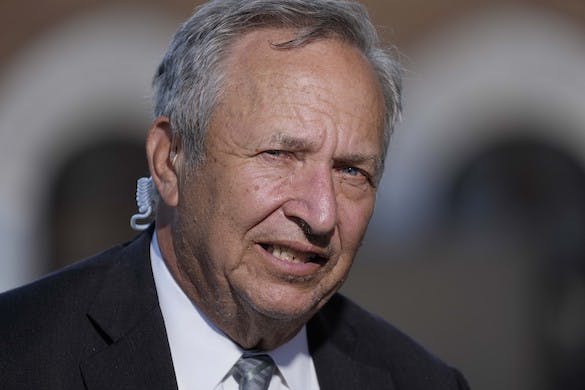Summers Tells Sun He Worries Economic Policy Being Driven by ‘Sentiment,’ ‘Politics’
His warnings on inflation were widely derided by left-leaning pundits and policy wonks, only to have proven prescient as the inflation rates have soared to levels not seen since Jimmy Carter was president.

The man who has served as treasury secretary, director of the National Economic Council, and the 27th president of Harvard worries that economic policy in America is being driven by “sentiment” and “politics” rather than by rigorous analysis.
If we abuse the “exorbitant privilege” of enjoying a reserve currency, Lawrence Summers warned, “we will cease to have it.”
Mr. Summers shared those reflections in a conversation with The New York Sun that touched on macroeconomics, campus politics, and the war in Ukraine. It made clear that even though he no longer formulates policy in Washington, D.C., Mr. Summers has remained a trenchant observer of the current scene.
His warnings on inflation were widely derided by left-leaning pundits and policy wonks, only to have proven prescient as the inflation rates have soared to levels not seen since Jimmy Carter was president. An essay published in New York magazine in January was titled, “Was Larry Summers Right All Along?”
While demurring on endorsing a return to the gold standard and opining that “a flexible exchange rate regime is broadly appropriate,” Mr. Summers did suggest that the U.S. “faces serious inflation issues because it pursued excessively easy monetary policy even as inflationary storms were gathering.”
That seemed to be an implicit criticism of the Federal Reserve from a sage who, in 2013, was one of the two leading candidates to lead the central bank. The other, Janet Yellen, ultimately got the job and now is treasury secretary, the job Mr. Summers formerly held.
Surveying a domestic and international arena in flux and crisis, Mr. Summers sounds a note of sober caution and observes that “this is a moment when American policymakers need to preserve the strength of the American dollar and make sure currency is sound.”
As Mr. Summers spoke, the value of the dollar was lurking at less than a 1,900th of an ounce of gold — down a staggering 86 percent from the date at which Mr. Summers left his post as treasury secretary. That, though Mr. Summers didn’t mention the point, underscores the scale of the crisis that has engulfed the dollar during the years that Mr. Summers wasn’t leading the treasury or the Fed.
More than dollars and cents are on Mr. Summers’s mind these days. As the Sun has reported, the Supreme Court will hear this fall arguments in Students for Fair Admissions v. Harvard, with the future of race-based admissions in higher education hanging in the balance.
Mr. Summers, who once led Harvard and still teaches and directs a center there, clearly feels constrained from commenting on the lawsuit itself. He did tell the Sun that universities “need to do a lot of soul searching with respect to many aspects of admissions.”
While asserting that American universities are the envy of the world, Mr. Summers also noted that too often they “pursue diversity” of various kinds but “resist intellectual diversity, including conservative and non-coastal viewpoints.” In the name of “comfort,” too many universities are “creating a stifling orthodoxy that is in its own way as oppressive as McCarthyism.”
Even while vigorously promoting diversity of all kinds, Mr. Summers said, “we must never lose sight of the lodestar of academic excellence.” He rued the replacement of standardized tests with more subjective approaches and criteria. Academic freedom is sacrosanct, Mr. Summers noted, even and especially when “what is being said makes people unhappy and offended.”
Finally, surveying the economic front of the war in Ukraine, Mr. Summers sees much to be proud of, feeling “encouraged by the degree of unity which has been reached in the Western Alliance, as well as the strength of the response that has damaged the ruble and crippled the Russian economy.”
Mr. Summers did sound a note of caution when it came to excessive use of sanctions, calling attention to the line between what we can do and what we should do to achieve American goals in Eastern Europe.
Whether that unity will be enough to save Ukraine remains to be seen, but what seems certain is that at a time of rapidly accelerating fiscal and foreign policy challenges, this highest-profile economist of his generation is certain to be at the center of public debates for years to come.

